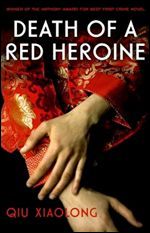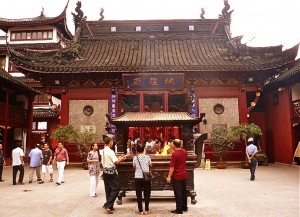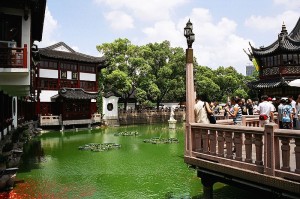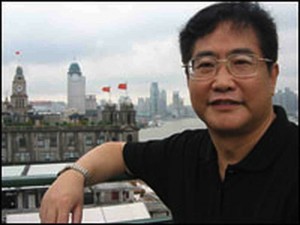Note: This novel was WINNER of the Anthony Award for Best First Novel by a mystery writer in 2001.
“As a chief inspector, [Chen] was supposed to seek justice by punishing the murderer, whoever it was. As a party member, he [also] knew what he was supposed to do…a Party member must serve, above all things, the interests of the Party. Here’s the problem. What were the interests of the Party?”
 Author Qiu Xiaolong, formerly a resident of Shanghai and citizen of the People’s Republic of China, has lived some of the issues which face his hero, Inspector Chen Cao, head of the special case squad, Homicide Division in Shanghai, as he tries to solve a murder in the first of six mysteries written by Qiu and set in China. The author, a scholar and lover of literature, was studying at Washington University in St. Louis, home of T. S. Eliot, doing research on Eliot’s life and work, when the dramatic uprising in Tiananmen Square took place in 1989. When Voice of America reported that Qiu had prepared and sold spring rolls to support students in China, thereby embarrassing China at this sensitive time, Qiu found himself unable to return home. He has remained in St. Louis with his wife and daughter since then, working as a poet, scholar, translator, and writer of mysteries featuring Inspector Chen.
Author Qiu Xiaolong, formerly a resident of Shanghai and citizen of the People’s Republic of China, has lived some of the issues which face his hero, Inspector Chen Cao, head of the special case squad, Homicide Division in Shanghai, as he tries to solve a murder in the first of six mysteries written by Qiu and set in China. The author, a scholar and lover of literature, was studying at Washington University in St. Louis, home of T. S. Eliot, doing research on Eliot’s life and work, when the dramatic uprising in Tiananmen Square took place in 1989. When Voice of America reported that Qiu had prepared and sold spring rolls to support students in China, thereby embarrassing China at this sensitive time, Qiu found himself unable to return home. He has remained in St. Louis with his wife and daughter since then, working as a poet, scholar, translator, and writer of mysteries featuring Inspector Chen.
In Inspector Chen, Qiu has created a kind of alterego, a poet who is also a policeman of impeccable honesty, a man who must walk the fine line between doing what the party believes is in the best interests of the country and what he sees as right in broader, less political terms. Inspector Chen, the hero of the series, beginning with Death of a Red Heroine (2000) and including A Loyal Character Dancer (2002), When Red is Black (2004), and most recently, Don’t Cry, Tai Lake (2012), recognizes that his privileges, such as his own apartment (at a time in which whole families are sharing a single room) and a high enough salary to be able to eat out occasionally, may be taken away at any moment if he does not hew to the party line.
As Qiu’s novels develop, the issues which concern Inspector Chen parallel those of many thoughtful Americans, not just their concerns over the goals of the country, but the difficulties which arise when a group which rules an enormous land area filled with a variety of different cultural entities tries to develop a single governance plan for the entire, diverse country. Qiu succeeds in creating human portraits of Chinese officers and party officials many of whom reveal sincere interests in doing what is “right,” even when their efforts seem more expedient and self-protective than philosophically and ethically justifiable.
In this first novel of the series, Inspector Chen and his assistant Yu investigate the death of a “Red Heroine,” Guan Hongying, a young woman who has achieved the status of a national model because she has worked at the biggest department store in Shanghai with total diligence for ten years. It is the early 1990s, and Guan has been found dead in a canal, miles from Shanghai. From the outset, Inspector Chen is alert to the political dangers of the case. Guan has frequently been mentioned in national newspapers, and her image has been on TV. As a result, one objective of the higher-ups in the party is to keep news of her murder out of the press. Before long, Chen and his men have identified a suspect – an HCC, a “high cadre’s child,” the son of a high party official, in this case the son of the Shanghai Minister of Propaganda. Accorded many privileges granted purely on the basis of his parents’ achievements, the suspect, Wu Xiaoming, works as a photographer for Red Star but is already being considered for a prestigious new position.

The City God Temple, mentioned in the novel as a meeting place in Shanghai, is a restoration of a 15th century Southern Sung Dynasty Temple, and also a marketplace.
Gradually, the characters and backgrounds of the various participants are revealed: Chen and his former lovers, one of whom is the daughter of a high cadre official; his assistant, Lu Guangming, who lives with his family in a tiny apartment and resents Chen’s extra privileges; the victim herself, Guan Hongying, who lived in a shady area of Shanghai, populated by prostitutes; the suspect, who drives a Lexus and has the means to dispose of a body; and Ouyang, a businessman whom Chen meets in Guangzhou, and who is able to secure information Chen is unable to obtain himself. As these characters are introduced, the author also introduces aspects of the Chinese political milieu and the limitations it presents for Chen, i.e., if he runs afoul of those in power, he will not only be removed from the case, he will be demoted or even relocated to another part of China. Walking the tight line, Chen exercises discretion, while also pursuing the case. A true believer in the goals of the party, Chen resents the tendency of some officials to put political expediency ahead of the ideals of the revolution.

The Tea House at the City God Temple complex, far right in this picture, is where Inspector Chen meets with Old Hunter for tea
Death of a Red Heroine, an unusual mystery for a western audience, provides much information about how the political system in China “works,” while also creating situations in which the reader empathizes with Chen as he tries to accomplish what he believes are the true goals of the country, as opposed to the personal goals of individual party officials. Since the author must explain much that is unfamiliar about Chinese daily life, significant parts of this novel “tell about” what is happening instead of showing what is going on through action. The unfamiliar names often sound similar, and some of them even look similar – Yu, Wu, Li – and readers may want to make a list of characters to avoid confusion, since there is no cast of characters in the book. The conclusion illustrates the difficulty of one individual operating within a closed system in which the power of political image-making can be overwhelming. Students of literature will be fascinated by the many quotations from Chinese and English poetry which illustrate the point of view and mindset of Inspector Chen throughout the novel. A complex and thoughtful novel which teaches at the same time that it entertains, Death of a Red Heroine is a fine introduction to this series, sure entice many readers into reading more of these mysteries about contemporary China and the people who keep the country running on all levels.
Photos, in order: The author’s photo appears on http://www.npr.org/
The Yellow Mountains are from http://www.topchinatravel.com/
The City God Temple, shown on http://en.wikipedia.org is posted by gruntzooki on http://flickr.com/photos/37996580417@N01/1349429615
The Tea House at City God Temple appears on http://en.wikipedia.org and was submitted by Sitomon from http://www.flickr.com/photos/sitomon/2050635031


